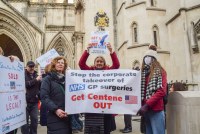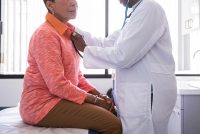Latest KFF Health News Stories
Survivors of Gangs and Gun Violence, These Women Now Help Others Navigate Grief
As teens, these three women lived amid street gangs around East St Louis, Illinois. Now, as adults, they support the families who have lost loved ones to gun violence. And because of their past, some residents trust them more than they do the police.
Journalists Recap Coverage of Gun Violence, Drug Imports, and Mental Health
KHN and California Healthline staff made the rounds on national and local media this week to discuss their stories. Here’s a collection of their appearances.
Seasonal Cooks’ Secret Sauce: Heaping Nutrition and Cultural Zest
Two “nutrition ambassadors” from Oldways, an organization that makes tradition and pride centerpiece ingredients in food education, invite KHN into their kitchens for a peek at A Taste of African Heritage dishes to accompany holiday celebrations.
KHN’s ‘What the Health?’: The Covid Response Coordinator Speaks
In this special episode of KHN’s “What the Health?” Dr. Ashish Jha, the White House coronavirus response coordinator, talks with host Julie Rovner, KHN’s chief Washington correspondent, about where we are in the pandemic and how we should transition out of the public health emergency. This episode was taped on Dec. 20.
Inmigrantes detenidos en centros enfrentan riesgo de covid como al inicio de la pandemia
Para las aproximadamente 30,000 personas que viven en espacios cerrados en la red de instalaciones de detención de inmigrantes del país, covid sigue siendo una amenaza constante.
‘Caged … For No Fault of Your Own’: Detainees Dread Covid While Awaiting Immigration Hearings
Covid remains a threat for the roughly 30,000 people in the country’s network of immigration facilities. But ICE continues to flout its own pandemic protocols, an extension of the facilities’ poor history of medical care.
ER Doctors Call Private Equity Staffing Practices Illegal and Seek to Ban Them
Doctors, consumer advocates, and some lawmakers are looking forward to a California lawsuit against private equity-backed Envision Healthcare. The case is part of a multistate effort to enforce rules banning corporate ownership of physician practices.
‘An Arm and a Leg’: Getting Insurance to Pay for Oral Surgery Is Like Pulling Teeth
A car crash left a woman in need of oral surgery, but her health insurance wouldn’t cover it. Her ongoing fight shows podcast host Dan Weissmann the weird way insurance treats teeth and reveals a big problem in the Obamacare marketplace.
Centene, Under Siege in America, Moved Into Britain’s National Health Service
A nine-minute public hearing gave the U.S. insurance giant a foothold in Britain’s prized National Health Service. One doctor called it “privatization of NHS by stealth.” And critics worry that business efficiencies will degrade the quality of care.
The Case of the Two Grace Elliotts: A Medical Billing Mystery
A health system charged a woman for a shoulder replacement at a hospital across the country that she had not visited for years. She didn’t receive the care, but she did receive the bill — and the medical records of a stranger.
An Air Force Career Held up Because of Debt Owed for Medical Bills
Emergency room care left Samaria Bradford with $5,000 in medical bills. Now she has to track down and pay that debt before she can hope to enlist in the military.
Her Credit Was Ruined by Medical Debt. She’s Been Turned Away From Doctors, Jobs, and Loans
When Penelope Wingard’s cancer went into remission, she lost her Medicaid coverage in North Carolina. Without insurance, the debts piled up for her follow-up care. She doesn’t think she’ll ever get ahead of it.
A Retiree Returns to Work After a Calamitous Year of Health Emergencies
In 2020, diabetes and covid-19 landed David Zipprich in the hospital three times. Even with insurance, he was inundated with bills, debt notices, and calls from collectors.
From Her View in Knoxville, the Health System Is ‘Not Designed for Poor People’
Monica Reed was the first in her family to own a home and has lived “a frugal kind of life.” Cancer treatment left her with almost $10,000 in debt, pushing her to the edge financially.
A Medical Cost-Sharing Plan Left Pastor With Most Of The Cost
Jeff and Kareen King joined a medical cost-sharing plan advertised as a “refreshing non-insurance approach” to paying for health care. It had a big proviso: Preexisting conditions like Jeff’s heart condition were not fully covered for the first two years. He needed heart surgery after just 16 months.
Hundreds of Hospitals Sue Patients or Threaten Their Credit, a KHN Investigation Finds. Does Yours?
An examination of billing policies and practices at more than 500 hospitals across the country shows widespread reliance on aggressive collection tactics.
Inside a Children’s Hospital: Struggling to Cope With a Surge of Respiratory Illness
Pediatric cases of RSV and flu have families crowding into ERs, as health systems juggle staff shortages. In Michigan, only 10 out of 130 hospitals have a pediatric ICU.
Medicare Pay Cuts Will Hurt Seniors’ Care, Doctors Argue
New reductions in Medicare payments in 2023 will drive more doctors away from accepting Medicare patients, physicians say. They are again pushing back on efforts largely designed to control government spending.
The Official Who Investigates Suspicious Deaths in Your Town May Be a Doctor — Or Not
Across the country, there are no consistent requirements for the officials who investigate suspicious and unexpected deaths. Some have no medical training, others are doctors trained in forensic pathology. Washington, California, Illinois, and Georgia are among the states that have recently attempted to make changes — with mixed success.
After Tuition, Books, and Room and Board, Colleges’ Rising Health Fees Hit a Nerve
Many colleges require students to have health insurance coverage, and the college option can be costly. In addition, some schools mandate that students pay a fee to cover health services on campus.





















